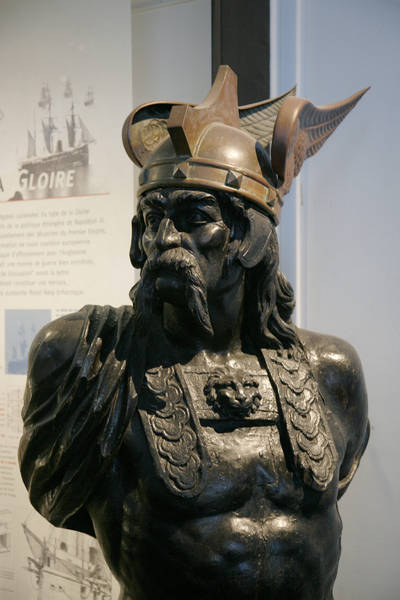Today in History - July 16
• The Gauls Attack Rome
• The Rise of Islam
• A Protestant Martyr
-- Compiled by James Finlayson-Bald
 Brennus, the leader of the Senones (Senonian Gauls), under whom the Gauls won the Battle of Allia, 12 miles from Rome, and then attacked Rome itself. (This bust of Brennus is located in the Musée de la Marine, France. Photo: Med.)
On this date:
390 BC—The Senonian Gauls under their leader Brennus, defeated the Romans beside the Allia, eleven miles from Rome. This branch of the Gauls had developed a military organisation, including cavalry with iron horseshoes - an innovation in ancient warfare - and infantry armed with finely-tempered slashing broadswords. The Roman force they faced was the largest the City had ever put in the field, perhaps 15,000 men. However, in the battle that followed, the Roman phalanx of heavily armed spear-carrying soldiers was rushed by the much faster cavalry and infantry of the Gauls and outreached by their swords. The Roman army was routed, and most of its soldiers plunged into the Allia and were drowned. Brennus and his army marched on to Rome and pillaged and set fire to it. Rome had fallen to its first barbarian conquerors, something that would not happen again for 800 years.
Brennus, the leader of the Senones (Senonian Gauls), under whom the Gauls won the Battle of Allia, 12 miles from Rome, and then attacked Rome itself. (This bust of Brennus is located in the Musée de la Marine, France. Photo: Med.)
On this date:
390 BC—The Senonian Gauls under their leader Brennus, defeated the Romans beside the Allia, eleven miles from Rome. This branch of the Gauls had developed a military organisation, including cavalry with iron horseshoes - an innovation in ancient warfare - and infantry armed with finely-tempered slashing broadswords. The Roman force they faced was the largest the City had ever put in the field, perhaps 15,000 men. However, in the battle that followed, the Roman phalanx of heavily armed spear-carrying soldiers was rushed by the much faster cavalry and infantry of the Gauls and outreached by their swords. The Roman army was routed, and most of its soldiers plunged into the Allia and were drowned. Brennus and his army marched on to Rome and pillaged and set fire to it. Rome had fallen to its first barbarian conquerors, something that would not happen again for 800 years.
AD 622—The Hegira. The beginning of the Muslim Era. In 622 Mohammed, intent on escaping the persecutions of his kinsmen of the Quraish tribe, emigrated from Mecca to Medina. The Hegira era (AH), was introduced by Omar, the second caliph. As Muharram was the first lunar month of the year that had been in use in the pre-Islamic Hejaz, Omar started the first year of the Hegira with the first day of that month. This introduction took place in the year 639 (AH 17). In the year 1088 (AD 1677) the Ottoman government, keeping the Hegira era, began to use the solar year (following the Julian calendar) which became known as the "marti" (March) year. Eventually two different dates came to exist, one the older Mohammedan era, the other the Ottoman Hegira year. The difference comes from the fact that the Moslem (lunar) year is about 11 days shorter than the Christian (solar) year.
1546—Mistress Anne Askew, Protestant martyr, died. Becoming convinced of the falsity of the doctrine of transubstantiation, she left her husband, Thomas Kyme, a Lincolnshire JP, went up to London and joined a band of rather staunch Protestants. She was arrested and committed to Newgate Prison, "for that she was very obstinate and heady in reasoning in matters of religion". She was taken to the Tower and racked, but she "would not convert for all her pain". She was imprisoned for four weeks and, on this date, was taken to Smithfield and burnt at the stake.
1918—The Bolsheviks allegedly massacred the Russian Royal Family at Ipatiev House in Ekaterinburg.
1945—The U.S. exploded the first atomic bomb at Alamagordo, New Mexico — an innovation in modern warfare.
Birthdays:
Mary Baker Eddy, founder of Christian Science (1821-1910)
Ginger Rogers, dancer and actress (1911-95)
Quote:
"Don't imagine I regard foreigners as inferior - they fascinate me." — Harold Wilson.
The above article was written by James Finlayson-Bald.
Edited and illustrations added by David Paul Wagner.
|
